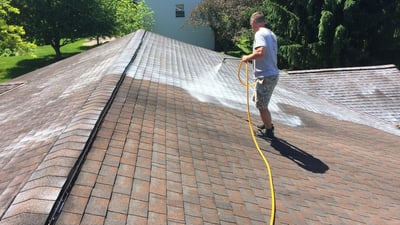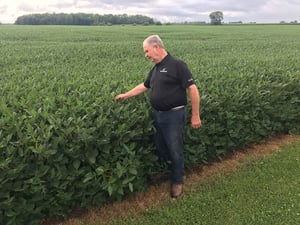Soy-biobased innovations are reaching new heights. New soy-biobased product, Roof Maxx, reverses aging in asphalt shingles and is recognized as a USDA Certified Biobased Product in the Department of Agriculture's BioPreferred Program. The product has a tested biobased content of 86 percent.
 Ohio State University assessed the Roof Maxx asphalt restorer in a new technical report, concluding that the product exhibits great potential to be an economical biobased solution for both maintaining and increasing a roof’s service life.* Extending the life of the roof saves money for the property owner and simultaneously cuts the waste streams headed to landfills.
Ohio State University assessed the Roof Maxx asphalt restorer in a new technical report, concluding that the product exhibits great potential to be an economical biobased solution for both maintaining and increasing a roof’s service life.* Extending the life of the roof saves money for the property owner and simultaneously cuts the waste streams headed to landfills.
According to the Northeast Recycling Council, the U.S. generates more than 11 million tons of asphalt shingle waste bound for landfill each year. While recycling programs for asphalt shingles do exist, the solution is only partially effective; tear-off debris including nails and wood are hard to separate and can damage the machinery that grinds the shingles. Recycling facilities become a mere pit stop to the landfill.
Ohio-based brothers, Todd and Mike Feazel, opted for a more sustainable solution. After 24 years of building a roof replacement company, the Feazels launched Roof Maxx in 2017. The soy-based sealer revives sloped shingle roofs and reduces landfill waste, all at a fraction of the cost of a total roof replacement. With the help of the Ohio Soybean Council, Roof Maxx has since moved from using a toll producer to producing it themselves in Ohio.
The brothers believe in the product so much that they offer a guarantee to extend service life five years per treatment, up to 15 years with multiple treatments. Furthermore, they make Roof Maxx with methyl soyate, which has the full-green circle designation on the EPA’s Safer Chemicals Ingredient List (SCIL).
“When we started researching products, we weren’t looking for soy, but we’ve learned a lot about soy since then,” said Feazel. “The core technology was developed out of the University of Maryland while they were working on a lubricant for grinders used in the roof-to-roads program.”
Researchers discovered that soy-based lubricant was the ideal solution to a variety of issues. Unlike asphalt, the lubricant kept machinery blades clean while also providing an environmentally-friendly solution for outdoor application without any toxic residue. The same properties that protected the equipment provided a water-repelling, flexible solution for roofing shingles.
“We feel there is a huge market potential, it’s not a replacement, but a preventative maintenance product to boost an aging roof’s usefulness by five or ten years,” said Feazel. “And the process can cost up to 90% less than a roof replacement.” In addition to boosting the life of a roof, Roof Maxx now has the ability to clean roofs as well, adding more value to the home owner. Developed by Ohio Soybean Council, this new product is being evaluated this summer.
An application of Roof Maxx extends the life of shingles for five years and can be re-applied to extend the life of a roof for up to 15 years. According to the Feazels, the average lifespan of a standard roof is around 15 years, meaning an application of Roof Maxx could double the lifespan at a fraction of the cost.
*The Ohio State University study was based on laboratory testing conducted by PRI Materials Testing Labs in Tampa, FL using ASTM International performance standards.
Disclaimer: This is not an endorsement by The Ohio State University.
Sustainability Begins Below Ground for Ohio Soybean Farmer Keith Kemp
 Ohio soybean farmer and United Soybean Board Director Keith Kemp is excited that the soybeans growing on his Ohio farm can contribute to the Roof Maxx product that he had applied to his own home. Here’s a snapshot of how soybean growers like Keith are part of the growing bioeconomy offering rapidly renewable ingredients for products like Ohio-made Roof Maxx.
Ohio soybean farmer and United Soybean Board Director Keith Kemp is excited that the soybeans growing on his Ohio farm can contribute to the Roof Maxx product that he had applied to his own home. Here’s a snapshot of how soybean growers like Keith are part of the growing bioeconomy offering rapidly renewable ingredients for products like Ohio-made Roof Maxx.
Family Farm History: Keith’s family has farmed since the 1940s. His son will be the fifth generation to carry on their farm located in West Manchester, Ohio.
Conservation Counts for Sustainability: The Kemp’s 2,000 acre soybean, corn and wheat farm has garnered multiple conservation awards. They have used no-till farming practices for 30-plus years, which allows earth worms to improve their soil and ensures minimal use of fertilizer. Auto steer also enables precision planting, another method which reduces excess use of water and fertilizer by employing big data to write prescriptions for every field. “We’re always looking for that new twist to make our soil more viable and become more sustainable for the future generations.”
From pickup trucks to tractors, every piece of diesel equipment on Kemp’s farm is powered by biodiesel. The Kemps have used cleaner burning biodiesel for 15 years, which benefits the environment as it grows demand for soybeans.


